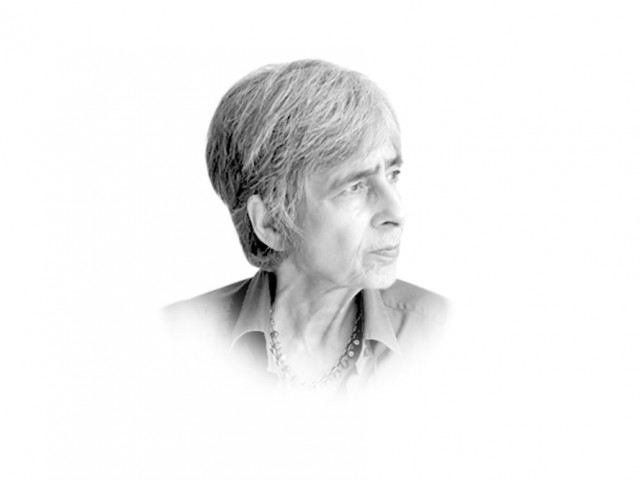The perception problem
It is the system of non-governance, calibre of leaders, their venality, that draws the opprobrium of so many observers

amina.jilani@tribune.com.pk
The reference to coyness was the reluctance of the Western press to call a spade a spade when it came to the crimes committed in the lands to which they have fled by those of Pakistani origin (later referred to as “gangsters” indulging in “grotesque behaviour”). He queried as to why such crimes were so prolific. He then launched forth on how “almost anyone in the Middle East will tell you” that Pakistan, the corrupt, politically savage and physically broken society is itself the cause of all the criminality. That means it’s the state, the government, which gives its citizens the lead. Again, can’t argue too much on that one, the country’s governments, military and civil, having proven to be, time and time again, mighty perversions in their own right.
Fisk is one of the most respected journalists of the Western press, a winner of countless awards, and an expert on the Middle East and its muddy affairs. Resident in Beirut since 1976, he is more familiar than probably any other correspondent on the region’s unhappy happenings. When the US and its allies took on the Taliban in Afghanistan at the end of 2001 he was transferred to Pakistan to cover the horrors unleashed.
In December of that year, at Kila Abdullah, he was badly beaten up by a few of the thousands of Afghans who had fled the conflict, and rescued by another. His ordeal was recorded in a column headed “My beating up by refugees is a symbol of the hatred and fury of this filthy war”. The brutality “was entirely the product of others — of us,” who had armed them and paid them twice over and then “bombed their homes and ripped up their families and called them ‘collateral damage”.
Fisk owns up to being “one of the few Brits I know who likes Pakistan”. It’s the people he likes (despite their perversions of religious bigotry) “who make Pakistan a wonderful country for any visitor if the traveler can avoid being kidnapped, raped, murdered or imprisoned”.
He was obviously here again after the Osama bin Laden affair as he quotes from the suppressed-by-the-government inquiry commission report. An unnamed minister reportedly recorded what he had been told by a US intelligence official: “You are so cheap … we can buy you with a visa, with a visit to the US, even with a dinner … ” Sadly, this is another accurate reflection of our honourable representatives and officials of state when it comes to our international ‘friends’. But they do not come cheaply on their home ground or to their fellow citizens.
What was most surprising in this column was that the knowledgeable and experienced Fisk allowed himself one glaring inaccuracy. Commenting on the ill-managed venture of Partition he writes that “within three decades, Pakistan was ‘re-partitioned’ by the loss of West Bengal … ”. A blunder indeed. And it wasn’t even edited.
Negative, even damning, perceptions of the country are common, voiced from without and within. It is the system of non-governance, the calibre of those who lead, their venality and constant surrender to the religious right, that draws the opprobrium of so many observers. And it is the people, barring those many who choose to play ‘follow the leader’, who pay for the sins committed by the top layer.
Published in The Express Tribune, March 14th, 2015.
Like Opinion & Editorial on Facebook, follow @ETOpEd on Twitter to receive all updates on all our daily pieces.














COMMENTS
Comments are moderated and generally will be posted if they are on-topic and not abusive.
For more information, please see our Comments FAQ